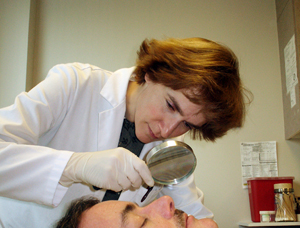  |
Living with your hairstyle |
 |
Alcohol
Alcohol, a common recreational drug taken as alcoholic drinks to relax, reduce inhibitions and increase social interactions. Women all react differently to alcohol ,depending on weight, frame, height and size. They are less tolerant of alcohol than man because of smaller body size and a greater proportion of fat, so a more concentrated level of alcohol remains in the blood. Tolerance to alcohol may be even further reduced prior to menstruation. Alcohol taken into the body passage from the stomach into the blood stream and is broken down in the liver by the enzyme alcohol dehydrogenase. In moderate amounts (2 units a day) alcohol raises the level of high density lipoprotiens in the blood, which reduces the levels of fat and cholestrol and helps prevent blood clot, arteriosclerosis and lessens the risk of heart disease. It may also help prevent high blood pressure. In larger amounts, alcohol has negative effects. Persistent misuse of alcohol may be in the form of regular but controlled heavy intake or of alcohol dependence (alcoholism). Heavy drinking can lead to inflammation of the liver (alcoholic hepatitis) or liver scarring (cirrhosis of the liver). Women often develop serious liver problems sooner than men and on a lower consumption of alcohol. Excess consumption causes damage to the PANCREAS, irritation of the stomach lining or an existing stomach ulcer, and increases the risk of stroke, hypertension and heart disease. The risks of developing cancer of the mouth, throat, larynx and oesophagus are increased with heavy drinking, especially if a person smokes tobacco. Alcohol also acts as a depressant. People dependent on alcohol generally feel sick, irritable and have the shakes in the morning or midway through the night and need alcohol to relieve the symptoms. They need alcohol to face the slightest stress and may drink alone, hiding their problem. They react angrily if someone discusses their drinking, may be aggressive, have accidents, injuries or blackouts, and possibly get into trouble at work, with the police and face financial difficulties and the loss of their families. Alcoholics are usually deficient in vitamin B1 (thiamin), B3 (niacin) and B9 (folic acid), as alcohol increases the amounts that the body requires for normal functioning. Thus deficiency diseases, such as Wernicke's encephalopathy, can develop, and without supplementation of thiamin there can be damage to the nervous system and brain damage caused by Korsakoff's syndrome in which there is severe amnesia, disorientation and delusions. Ultimately, alcoholism can lead to a form of dementia. Sudden withdrawal from regular heavy drinking can lead to delirium tremens, with severe tremors, hallucinations and convulsions. This condition can be life-threatening and needs urgent medical attention and sedatives. Treatment for alcoholism usually involves detoxification (recovery from acute intoxication and medical care), counseling and psychotherapy to understand the problems underlying the alcoholic habit. Specialist alcohol-treatment units exist in some hospitals and clinics. Alcoholics Anonymous has a large network of self-help groups that can help alcoholics and their families. Drinking alcohol in pregnancy can harm a developing baby and leave it with permanent physical or mental defects. This is particularly damaging in the early weeks of pregnancy, when many body organs and the nervous system are developing. An intake of more than 10 units a week increases the risks of delivering an underweight baby, and over 14 units a week may be linked to miscarriage. The higher the intake, the greater the likelihood of birth defects such as Foetal Alcohol Syndrome (FAS). FAS results in abnormal limb development, heart defects, cleft palate and hare lip, and lower intelligence (IQ). Characteristics of this syndrome are a receding chin, an eye fold giving the look of Down's Syndrome and a low and flat bridge to the nose. Development of the child may be retarded. Some doctors recommend pregnant women should not drink at all, but a safe limit appears to be I to 2 units of alcohol a day. (A unit of alcohol is half a pint of beer or lager, one glass of wine or one measure of spirits). |
|
 |
 |
 |
 |
|
|
|
||
Home | Contact Us | Disclaimer | Beauty Fitness Directory | Add a Site | Site Map | BLOG | Beauty and Fitness Articles
| Skin Care | Skin Disease | Makeup | Beauty | A-Z Dermatology | Beauty and Fitness | Home remedies and products | Women's Health | Nail Care Copyright © 2005 Beauty Fitness Guide. All rights reserved :: The contents of this website may not be reprinted in any form without permission from the website administrator. Any attempts will result in swift action. |
|||